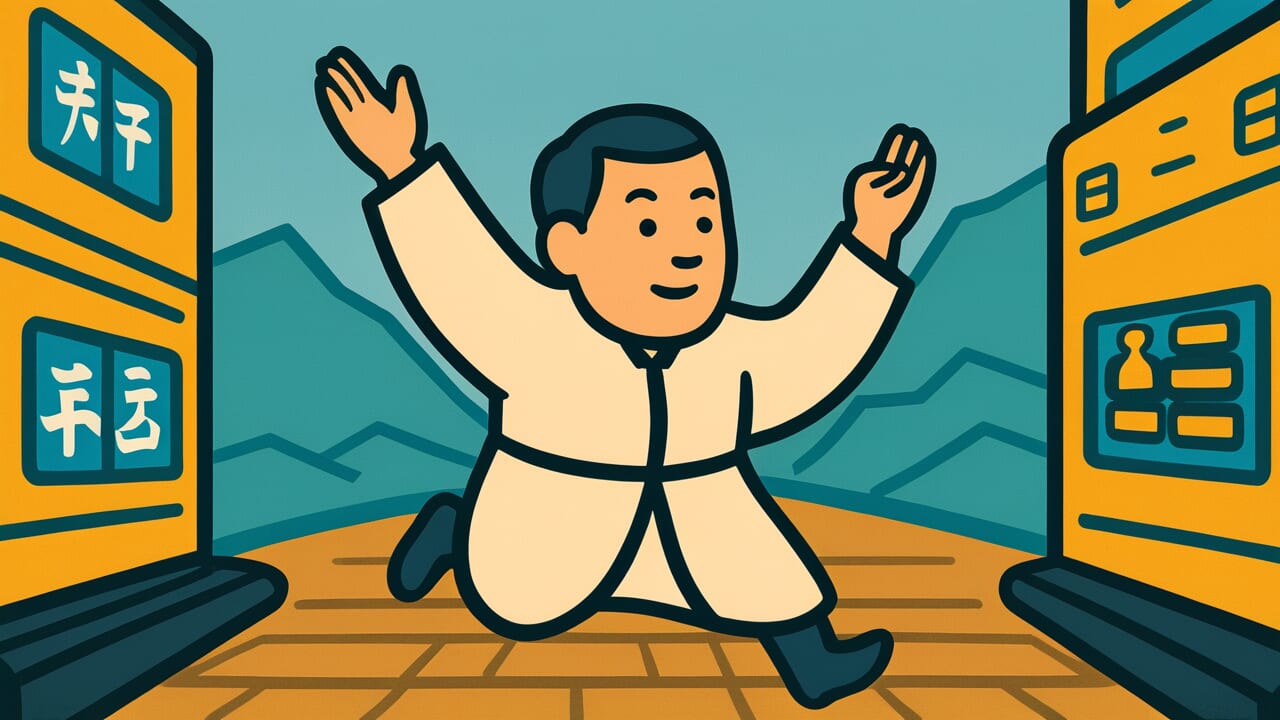How to Read “Trading Chinese goods leaps a thousand miles in one jump”
Karamono akinai wa senri hitottobi
Meaning of “Trading Chinese goods leaps a thousand miles in one jump”
“Trading Chinese goods leaps a thousand miles in one jump” means that large-scale trade with distant places can bring enormous profits with just one success. It expresses a once-in-a-lifetime chance to make a fortune.
This proverb shows the unique nature of long-distance trade compared to regular business. Daily trade with neighbors builds up small profits gradually.
But trade with faraway places happens less often. However, one success can bring huge earnings. This contrast is built into the saying.
People use this phrase when talking about business opportunities that carry high risk but promise big returns if successful.
It also describes chances for dramatic turnarounds, different from steady effort. Even today, the meaning applies well to large international deals or risky investments.
Origin and Etymology
No clear written records explain the origin of this proverb. But the words themselves reveal an interesting background.
“Karamono” refers to precious goods imported from China. During the Edo period, these items were extremely valuable foreign products.
They included porcelain, silk fabrics, medicinal materials, and paintings. These goods entered through Dejima in Nagasaki. Common people could not afford such luxuries. Only select merchants could handle them.
“Leaping a thousand miles in one jump” expresses how successful trade with distant places brings massive profits. The image uses the idea of leaping.
Trade with China literally covered distances over a thousand miles. Sea voyages carried real dangers. But if merchants could safely obtain goods and sell them, profits far exceeded ordinary business.
This proverb likely came from merchants expressing their real experience with high-risk, high-return long-distance trade. The dynamic phrase “one jump” captures how profits could soar dramatically from a single success.
Interesting Facts
During the Edo period, only specially licensed merchants could trade in Chinese goods. This was a privileged business.
Chinese goods traded through the Nagasaki Trading House included celadon and white porcelain, luxury silk fabrics, and raw materials for Chinese medicine.
Samurai families and wealthy townspeople treasured these items. A single item could be worth several million yen in today’s money.
The expression “a thousand miles” shows not just actual distance to China but also psychological remoteness.
With the sailing technology of that time, round trips took several months. Dangers from weather and pirates were real. That made the joy and profit from successful trade all the more special.
Usage Examples
- He decided to enter emerging markets. Trading Chinese goods leaps a thousand miles in one jump—if successful, the company’s scale will change dramatically
- Steady sales work matters, but sometimes we should challenge big projects like trading Chinese goods leaps a thousand miles in one jump
Universal Wisdom
“Trading Chinese goods leaps a thousand miles in one jump” contains an instinctive human understanding of risk and return.
Why are people drawn to big chances with danger rather than safe paths?
Humans fundamentally want to surpass their current situation. People know there are heights that steady accumulation alone cannot reach.
One big success can equal or exceed years of small efforts. Our ancestors understood this fact through the world of trade.
But this proverb has survived not simply to praise getting rich quick. It also includes a calm recognition that big chances carry big risks.
The distant “thousand miles” symbolizes difficulties not easily overcome.
Life has times for building small happiness through stable daily routines. It also has times for challenging yourself to make great leaps.
This proverb recognizes the value of both. Yet it teaches the significance of sometimes having courage to aim far.
When AI Hears This
In trading Chinese goods, information to judge authenticity and value is extremely unbalanced. Sellers have information about the origin.
But buyers know nothing about products from distant foreign lands. The greater this information gap, the higher the expected profit from a single transaction actually jumps.
Behavioral economics calls this “option value.” Trades with high uncertainty hold potential for enormous profits when they hit.
For example, in modern venture capital, you might invest in ten companies. Nine might fail, but if one succeeds greatly, the whole portfolio profits. Trading Chinese goods has exactly the same structure.
Even more interesting is the time cost of obtaining information. In the Edo period, confirming Chinese market information required several months round trip.
During that time, prices fluctuated. The time spent gathering information itself became opportunity loss. So merchants chose not to “gather information for certain profit” but to “bet big while uncertain.”
This closely resembles modern cryptocurrency trading. In markets with volatile prices and unclear information, betting large for one-time recovery can be mathematically more rational than frequent small trades.
The expression “leaping a thousand miles in one jump” brilliantly captures the special economic rationality created by information gaps.
Lessons for Today
This proverb teaches you that life contains different kinds of opportunities. Daily accumulation matters, but sometimes chances for great leaps arrive.
When that moment comes, will you be ready?
In modern society, globalization and digitalization have made the old “thousand miles” less distant. But this makes it more necessary to develop eyes that recognize truly valuable “Chinese goods.”
It might be a new market, innovative technology, or talent and potential no one has noticed yet.
What matters is not neglecting small daily business while keeping your eyes open for big chances. Build your foundation through steady effort while preparing to “leap” when the time comes.
This balance is the wisdom this proverb conveys to modern times. Your life’s chance for “leaping a thousand miles in one jump” is surely waiting somewhere.



Comments